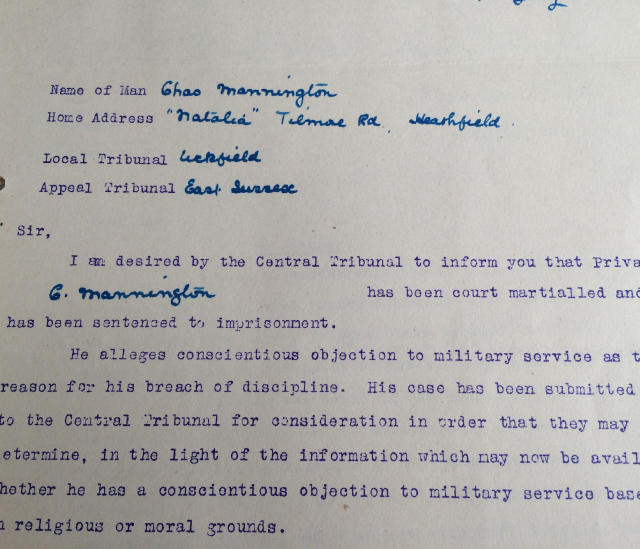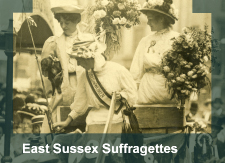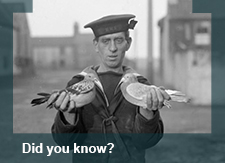Whilst recruitment and conscription saw many East Sussex men enter the ranks of the British Army some resisted service on grounds of conscience or religion.
First World War recruitment, which was built upon popular support largely peaked in the early months of the war in 1914. Propaganda posters and appeals to men’s patriotic instincts worked well but only to a point. The losses of men at the front either wounded or killed necessitated a constant stream of replacements and reinforcements.
Conscription
Before the war, Britain had been unique in the main European nations in that the armed forces had been made up of professional soldiers or volunteers with no compulsory military service. By 1916, this was no longer sustainable.
The Military Service Act of 1916 was not as simple as is now believed but, in essence, meant that every unmarried or widowed man between the ages of 19 and 40 was now eligible to be conscripted into the British Army. The provisions of the Act would change several times over the duration of the war so that, by 1918, it covered married men between the ages of 18 years 6 months and 50 years old.
Whilst it was late in introducing conscription to the population, Britain further differed from the other nations by recognising Conscientious Objection as a legal way to be exempt from military service. Conscientious Objection was not the only method available for being granted an exemption. Men could also go before Military Service Tribunals on the grounds of ill health, work of national importance, or domestic hardship. In fact, Conscientious Objectors made up only a tiny fraction of those who came before the tribunals but were often among those most harshly treated as they often reflected wider public opinion as to the apparent cowardice or lack of character of the men. In total 16,000 men applied for exemption on the grounds of Conscientious Objection across the total span of the war. They represented 0.33% of those who fought. More British soldiers died on the First Day of the Somme than attempted to claim absolute Conscientious Objection during the entire war.

Letter from the Sussex Military Tribunal regarding a Conscientious Objector. East Sussex Record Office, The Keep
Claiming Conscientious Objection
To claim exemption on the grounds of conscience men often had to prove that they did indeed hold such a belief and it could be evidenced from before the war. If successful, men would be offered the option of undertaking some form of alternative work of national importance to the war effort but not requiring them to actively serve. These ‘alternativists‘ would carry out work such as farming, industry, or stretcher-bearing for the duration of the war. Those who refused any form of service, the ‘absolutists‘ were often imprisoned and risked being sentenced to death. Although no death sentences were carried out on Conscientious Objectors a number did die in prison and elsewhere because of the harsh conditions to which they were subjected.
A group of ‘alternativist’ Conscientious Objectors were put to work building roads near Seaford where a Sussex soldier wrote to his wife in 1917 about how men in the army treated those Conscientious Objectors:
They all were allowed leave at Easter and Xmas and get real good food. Don’t you think its rather unfair to us fellows? We often march past them and pass a good deal of comments etc; some-times there is a “rough-house” ending in a few C.O’s being badly “mauled” and a few of us chaps escorted back to the Guard-room and then punished “C.B. etc”. This is an everyday occurance [sic].
Earlier in 1916, those same Conscientious Objectors had been the subject of an arson attack by Canadian soldiers when the hut in which they were sleeping was tarred.

Letter from the Sussex Military Tribunal regarding a Conscientious Objector. East Sussex Record Office, The Keep
The Military Service Act did work in allowing Britain to field a larger army. The recruitment statistics for before and after its inception are almost identical with 2.46 million men enlisting before January 1916 and 2.5 million afterwards.
Whilst Conscientious Objection is seen as being a particularly First World War issue, numbers actually dramatically rose for the Second World War with over 60,000 men claiming for an exemption from service on the grounds of their conscience.
Sources
Blighty: British Society in the era of the Great War by Gerard DeGroot
Sussex in the First World War by Keith Grieves
The Last Great War by Adrian Gregory








